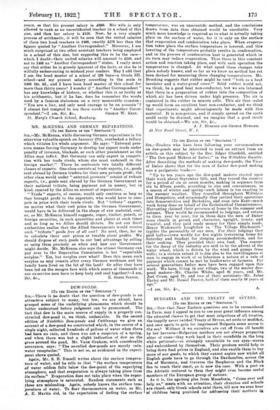MR. McKEN-NA AND GERMAN REPARATIONS. [To THE EDITOR OF THE
"SPECTATOR."'
SIR,—Mr. McKenna, while discussing German reparations in his otherwise valuable speech on January 27th, overlooked a fallacy which vitiates his whole argument. He says: "External pres- sure means forcing Germany to develop her export trade under Penalty of invasion, blockade, or such other punishment as the Allies may inflict. But Germany can only export in competi- tion with her trade rivals, whom she must undersell in the foreign market." There he confounds two totally different classes of exports. One class consists of trade exports, i.e., goods sent abroad by German traders for their own private profit; the other class would under "external pressure" consist of tribute exports, i.e., goods sent abroad by the German Government as their national tribute, being payment not in money, but in kind, exacted by the Allies on account of reparations.
"Trade" exports, of course, would only continue so long as they brought profit to the exporters, who would have to com- pete in price with their trade rivals. But "tribute" exports, no matter what their cost price to the German Government, would have to be delivered in the shape of raw material, coal, or, as Mr. McKenna himself suggests, sugar, timber, potash, or foreign securities, in such quantities and places at such times and so long as we Allies should dictate. Do not our fiscal authorities realize that the Allied Governments would receive such "tribute" goods free of all cost? No need, then, for us to calculate their cost prices or trouble about profits. We should dispose of such goods to our best advantage by selling or using them precisely as when and how our Government might decide. Mr. McKenna also says the utmost Germany can pay over to the Reparation Commission is her "exportable surplus." Yea, but surplus over what? Does this mean such surplus as may remain after every German workman and his family have lived on the fat of the land? Or after they have been fed on the meagre fare with which scores of thousands of our ex-service men have to keep body and soul together ?—I am,


































 Previous page
Previous page